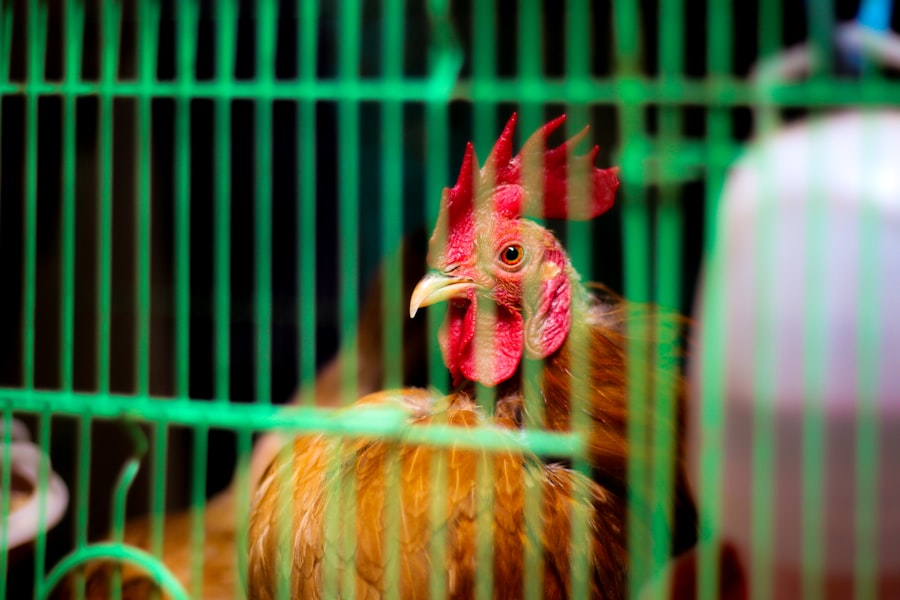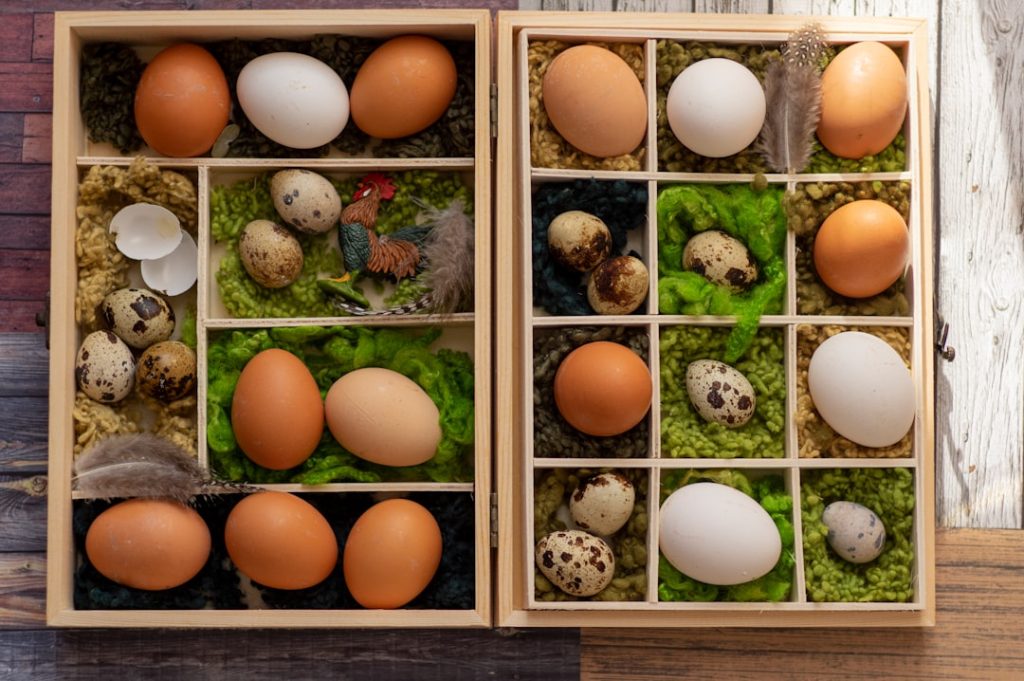When selecting chickens for a backyard flock, several factors should be considered. Climate is a crucial consideration, as some breeds are better adapted to cold weather, while others thrive in warmer conditions. The intended purpose of the flock is also important, whether it’s for egg production or meat.
Egg-laying breeds differ from those raised primarily for meat. Additionally, the temperament of the breed should be taken into account, as some chickens are more docile and friendly, while others can be more aggressive. The Rhode Island Red is a popular breed for backyard flocks, known for its excellent egg-laying capabilities and adaptability to various climates.
They are generally friendly and docile, making them suitable for families with children. Another common choice is the Plymouth Rock, which is also recognized for its egg production and amiable nature. For those interested in meat production, the Cornish Cross is a favored option due to its rapid growth and high meat-to-bone ratio.
Ultimately, the ideal breed for a backyard flock depends on specific requirements and preferences. Thorough research is essential before making a decision to ensure the chosen breed aligns with the keeper’s goals and circumstances.
Table of Contents
- 1 Coop and Run Requirements
- 2 Feeding and Watering
- 3 Health and Hygiene
- 4 Predator Protection
- 5 Egg Collection and Storage
- 6 Local Regulations and Permits
- 7 FAQs
- 7.1 What are the benefits of keeping chickens on your property?
- 7.2 What do chickens need to thrive on a property?
- 7.3 Are there any local regulations or restrictions for keeping chickens on your property?
- 7.4 How do you protect chickens from predators on your property?
- 7.5 What are some common health issues for chickens and how can they be prevented?
- 7.6 How do you maintain a clean and odor-free environment when keeping chickens on your property?
Key Takeaways
- Consider the climate, space, and purpose of raising chickens when choosing the right breed for your backyard.
- Provide at least 2-3 square feet of coop space per chicken and 8-10 square feet of run space per chicken for their comfort and well-being.
- Ensure a balanced diet for your chickens with a mix of commercial feed, kitchen scraps, and access to fresh water at all times.
- Regularly clean the coop, provide proper ventilation, and monitor for signs of illness to maintain the health and hygiene of your chickens.
- Install secure fencing, locks, and predator-proofing measures to protect your chickens from potential threats like raccoons, foxes, and birds of prey.
Coop and Run Requirements
Coop Requirements
When it comes to building a coop for your backyard flock, there are several key considerations to keep in mind. The coop should provide protection from predators and the elements, as well as plenty of space for the chickens to roost and lay eggs. Adequate ventilation is also crucial to prevent moisture buildup and ammonia levels from rising.
Run Requirements
The run should be spacious enough to allow the chickens to move around freely and engage in natural behaviors like scratching and dust bathing. Additionally, it’s essential to provide plenty of shade and shelter from the sun, as well as protection from predators like hawks and raccoons.
Building and Maintaining the Coop and Run
When it comes to building a coop and run for your backyard flock, there are several options to consider. You can purchase a pre-made coop and run, or you can build one yourself using plans available online or at your local hardware store. If you choose to build your own coop and run, be sure to use high-quality materials that will provide adequate protection and insulation for your chickens. Regular cleaning and maintenance of the coop and run are also crucial to prevent the buildup of bacteria and parasites.
By providing a safe and comfortable coop and run for your backyard flock, you can ensure that your chickens will be healthy and happy for years to come.
Feeding and Watering
Feeding and watering your backyard flock is an important aspect of raising chickens. A balanced diet is essential for the health and productivity of your chickens, so it’s important to provide them with a high-quality feed that is specifically formulated for their needs. Additionally, it’s important to provide access to fresh water at all times, as dehydration can quickly become a serious issue for chickens.
When it comes to feeding your backyard flock, there are several options to consider. You can purchase commercial chicken feed that is formulated for different stages of life, such as starter feed for chicks and layer feed for adult hens. You can also supplement their diet with kitchen scraps, fruits, vegetables, and grains to provide additional nutrients and variety.
It’s important to monitor their food intake and adjust their diet as needed based on their age, activity level, and overall health. In addition to providing a balanced diet, it’s important to ensure that your chickens have access to clean and fresh water at all times. You can use a traditional waterer or invest in an automatic watering system to ensure that your chickens always have access to water.
It’s also important to regularly clean and sanitize the waterers to prevent the buildup of bacteria and algae. By providing a balanced diet and access to fresh water, you can ensure that your backyard flock will be healthy and productive.
Health and Hygiene
Maintaining the health and hygiene of your backyard flock is essential for their overall well-being. Regular health checks are important to monitor for signs of illness or injury, as well as to prevent the spread of disease within the flock. Additionally, it’s important to keep the coop and run clean and free of debris to prevent the buildup of bacteria and parasites.
One important aspect of maintaining the health of your backyard flock is regular health checks. This involves monitoring your chickens for signs of illness or injury, such as changes in behavior, appetite, or egg production. It’s also important to check for external parasites like mites and lice, as well as signs of respiratory or digestive issues.
If you notice any concerning symptoms, it’s important to consult with a veterinarian who specializes in poultry health. In addition to regular health checks, it’s important to keep the coop and run clean and free of debris. This involves regularly removing soiled bedding, droppings, and uneaten food from the coop and run.
It’s also important to regularly sanitize the coop and run to prevent the buildup of bacteria and parasites. By maintaining a clean and hygienic environment for your backyard flock, you can help prevent the spread of disease and ensure that your chickens remain healthy and happy.
Predator Protection
Protecting your backyard flock from predators is essential for their safety and well-being. There are several common predators that pose a threat to chickens, including raccoons, foxes, hawks, and snakes. It’s important to take proactive measures to secure the coop and run to prevent predators from gaining access to your chickens.
One effective way to protect your backyard flock from predators is by securing the coop with sturdy locks and latches that are resistant to tampering. Additionally, it’s important to reinforce the coop with hardware cloth or welded wire mesh to prevent predators from digging under or chewing through the walls. It’s also important to secure the run with a roof or netting to prevent aerial predators like hawks from swooping in.
In addition to securing the coop and run, it’s important to be vigilant about potential threats from predators in your area. This may involve setting up motion-activated lights or alarms around the coop and run, as well as removing potential hiding spots for predators like brush piles or tall grass. By taking proactive measures to protect your backyard flock from predators, you can ensure that they remain safe and secure.
Egg Collection and Storage

Frequency of Egg Collection
When collecting eggs from your backyard flock, it’s vital to do so at least once a day to prevent them from being damaged or eaten by other chickens. Handle eggs gently to prevent cracking or breaking the shells. Use a basket or egg carton to collect eggs from the nesting boxes, being careful not to stack them too high or too tightly.
Proper Storage of Eggs
Once you’ve collected eggs from your backyard flock, it’s essential to store them properly to ensure their freshness and quality. You can store eggs at room temperature for up to a week, or in the refrigerator for up to a month. Store eggs with the pointed end down to help maintain their freshness.
Cleaning and Handling Eggs
Additionally, it’s crucial to wash eggs before storing them if they are soiled, but it’s not necessary if they are clean. By following these simple steps, you can enjoy fresh, high-quality eggs from your backyard flock.
Local Regulations and Permits
Before starting a backyard flock, it’s important to research local regulations and obtain any necessary permits or licenses. Some areas have specific zoning laws or ordinances that regulate the keeping of chickens within city limits or residential areas. Additionally, some areas may require permits or licenses for keeping chickens due to health or noise concerns.
It’s important to research local regulations regarding backyard flocks before getting started. This may involve contacting local government offices or animal control agencies to inquire about specific zoning laws or ordinances that pertain to keeping chickens within city limits or residential areas. Additionally, it may be necessary to obtain permits or licenses for keeping chickens if required by local regulations.
By researching local regulations and obtaining any necessary permits or licenses before starting a backyard flock, you can ensure that you are in compliance with local laws and ordinances. This can help prevent potential issues with neighbors or authorities down the line, as well as ensure that you are able to enjoy raising chickens in a responsible and legal manner. In conclusion, raising a backyard flock of chickens can be a rewarding experience that provides fresh eggs, natural pest control, and entertainment for the whole family.
By choosing the right breed of chickens, providing a safe and comfortable coop and run, maintaining proper feeding and watering practices, ensuring health and hygiene, protecting against predators, collecting eggs properly, and researching local regulations and permits, you can create a successful backyard flock that will thrive for years to come.
If you’re considering keeping chickens on your property, you may also be interested in learning about how to keep ducks. Poultry Wizard has a helpful article on what to feed ducks, which can provide valuable information for anyone looking to raise poultry. Check out the article here for more tips on caring for ducks. And if you’re specifically interested in building a chicken coop, Poultry Wizard also has articles on the topic, such as this one and this one.
FAQs
What are the benefits of keeping chickens on your property?
Keeping chickens on your property can provide you with a sustainable source of fresh eggs, natural pest control, and fertilizer for your garden. They also make great pets and can help reduce food waste by eating kitchen scraps.
What do chickens need to thrive on a property?
Chickens need a secure coop or shelter to protect them from predators and the elements, access to fresh water, a balanced diet of chicken feed and kitchen scraps, and space to roam and forage.
Are there any local regulations or restrictions for keeping chickens on your property?
Local regulations and restrictions for keeping chickens vary by city and county. It’s important to check with your local government or homeowners’ association to ensure that keeping chickens is allowed on your property and to understand any specific requirements or limitations.
How do you protect chickens from predators on your property?
To protect chickens from predators, it’s important to secure their coop with sturdy fencing, lockable doors, and predator-proof latches. Additionally, using motion-activated lights or alarms can help deter predators from approaching the coop.
What are some common health issues for chickens and how can they be prevented?
Common health issues for chickens include parasites, respiratory infections, and egg-laying problems. These can be prevented by providing a clean and dry living environment, regular health check-ups, and a balanced diet. It’s also important to practice good biosecurity measures to prevent the spread of diseases.
How do you maintain a clean and odor-free environment when keeping chickens on your property?
To maintain a clean and odor-free environment, it’s important to regularly clean the chicken coop, remove soiled bedding, and properly dispose of waste. Using absorbent bedding materials and providing proper ventilation can also help reduce odors.
Meet Walter, the feathered-friend fanatic of Florida! Nestled in the sunshine state, Walter struts through life with his feathered companions, clucking his way to happiness. With a coop that’s fancier than a five-star hotel, he’s the Don Juan of the chicken world. When he’s not teaching his hens to do the cha-cha, you’ll find him in a heated debate with his prized rooster, Sir Clucks-a-Lot. Walter’s poultry passion is no yolk; he’s the sunny-side-up guy you never knew you needed in your flock of friends!







